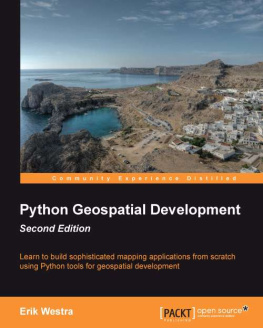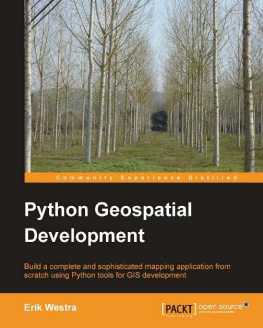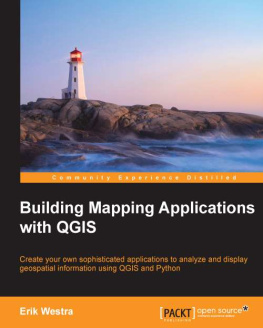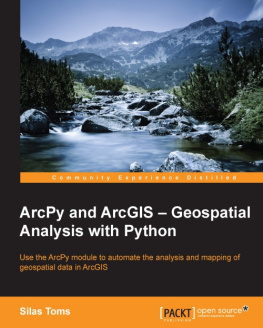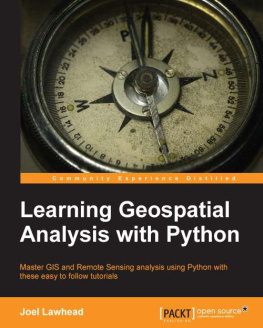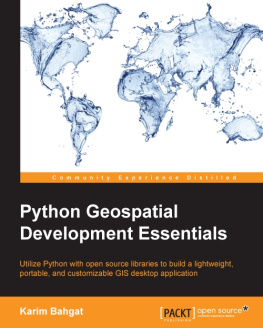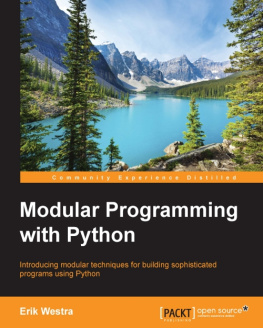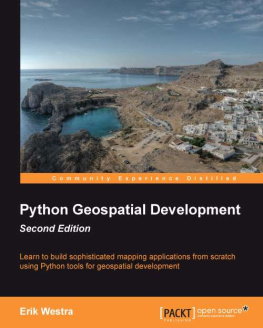About the Author
Erik Westra has been a professional software developer for over 25 years, and has worked almost exclusively in Python for the past decade. Erik's early interest in graphical user-interface design led to the development of one of the most advanced urgent courier dispatch systems used by messenger and courier companies worldwide. In recent years, Erik has been involved in the design and implementation of systems matching seekers and providers of goods and services across a range of geographical areas. This work has included the creation of real-time geocoders and map-based views of constantly changing data. Erik is based in New Zealand, and works for companies worldwide.
I would like to thank Ruth, the love of my life, for all of her support and encouragement.
About the Reviewers
Richard Marsden has over 15 years of professional software development experience. After starting in the field of geophysics and oil exploration, he has spent the last ten years running the Winwaed Software Technology LLC, an independent software vendor. Winwaed specialize in geospatial tools and applications including web applications, and operate the http://www.mapping-tools.com website for tools and add-ins for Microsoft's MapPoint product.
Richard also manages the technical aspects of the EcoMapCostaRica.com project for the Biology Department at the University of Dallas. This includes the website, online field maps, field surveys, and the creation and comparison of panoramic photographs.
Richard is also active in the field of natural language processing, especially with Python's NLTK package.
Will Cadell is a principal consultant with Sparkgeo.com. He builds next generation web mapping applications, primarily using Google Maps, geoDjango, and PostGIS. He has worked in academia, government, and natural resources but now mainly consults for the start-up community in Silicon Valley. His passion has always been the implementation of geographic technology and with over a billion smart, mobile devices in the world it's a great time to be working on the geoweb.
Will lives in Prince George, Northern British Columbia, and when he's not writing code or talking about geographic web technology you can find him on a ski hill with his family.
Silas Toms is a GIS programmer with ICF International. His main professional interests are programming in Python and automation of large-scale environmental impact analyses. He has lived in San Francisco for 6 years while finishing a masters in GIS at San Francisco State University on temperature interpolation. He wishes to thank his girlfriend and his family for being supportive of his many interests.
www.PacktPub.com
Support files, eBooks, discount offers and more
You might want to visit www.PacktPub.com for support files and downloads related to your book.
Did you know that Packt offers eBook versions of every book published, with PDF and ePub files available? You can upgrade to the eBook version at > for more details.
At www.PacktPub.com, you can also read a collection of free technical articles, sign up for a range of free newsletters and receive exclusive discounts and offers on Packt books and eBooks.
http://PacktLib.PacktPub.com
Do you need instant solutions to your IT questions? PacktLib is Packt's online digital book library. Here, you can access, read and search across Packt's entire library of books.
Why Subscribe?
- Fully searchable across every book published by Packt
- Copy and paste, print and bookmark content
- On demand and accessible via web browser
Free Access for Packt account holders
If you have an account with Packt at www.PacktPub.com, you can use this to access PacktLib today and view nine entirely free books. Simply use your login credentials for immediate access.
Preface
With the explosion of map-based websites and spatially-aware devices and applications, geospatial development is becoming increasingly important. The geospatial market is growing rapidly, and as a Python developer you can't afford to be left behind. In today's location-aware world, all commercial Python developers can benefit from an understanding of geospatial concepts and development techniques.
Working with geospatial data can get complicated because you are dealing with mathematical models of the Earth's surface. Since Python is a powerful programming language with high-level toolkits, it is well-suited to geospatial development. This book will familiarize you with the Python tools required for geospatial development. It introduces basic geospatial concepts with a clear, detailed walkthrough of the key concepts such as location, distance, units, projections, datums, and geospatial data formats. We then examine a number of Python libraries and use these with freely-available geospatial data to accomplish a variety of tasks. The book provides an in-depth look at the concept of storing spatial data in a database and how you can use spatial databases as tools to solve a variety of geospatial problems.
It goes into the details of generating maps using the Mapnik map-rendering toolkit, and helps you to build a sophisticated web-based geospatial map editing application using GeoDjango, Mapnik, and PostGIS. By the end of the book, you will be able to integrate spatial features into your applications and build a complete mapping application from scratch.

